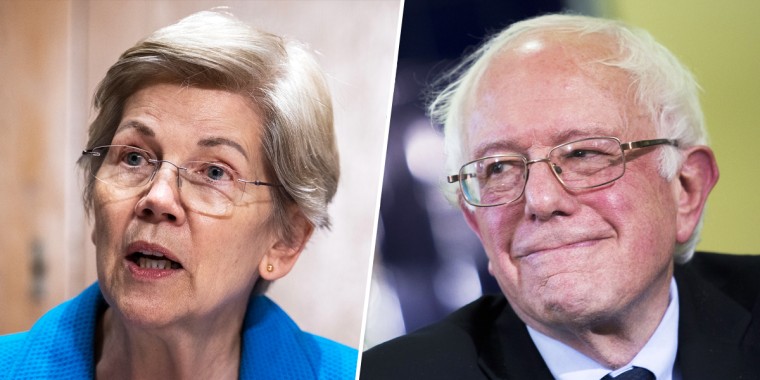WASHINGTON — While President Joe Biden’s team was quietly making plans to launch his re-election campaign, top advisers inside and outside the White House started an outreach effort to hold on to a crucial piece of the Democratic coalition: progressives.
Roughly a month before his campaign announcement, longtime Biden adviser Anita Dunn invited Faiz Shakir, the campaign manager for Sen. Bernie Sanders’ 2020 bid, to the White House. The meeting was a check-in with Shakir, who remains a political adviser to Sanders, to make sure he and other progressives knew they still had an open line to Biden's team.
The invitation was part of a lengthy outreach effort by senior administration officials to progressive leaders, much of it led by newly minted White House chief of staff Jeff Zients, whose appointment was greeted with a degree of skepticism by some in the progressive wing of the party.
Zients has personally reached out to Sanders, I-Vt., Sen. Elizabeth Warren, D-Mass. — two progressive rivals Biden dispatched in the 2020 primaries — and House Progressive Caucus Chair Pramila Jayapal, D-Wash., sources familiar with each of the talks said. All three have said they will support Biden next year.
“President Biden can run on major accomplishments that range from $35 insulin to the biggest climate package in the history of the world, paid for by my 15% minimum corporate tax,” Warren said in an interview. “The president has accomplished a lot, but he’s still got a lot of work to do. The most important thing is that the president is out there to talk about what he has done and what he plans to do next. That’s where the game really is.”
The early outreach is a sign to progressives that Biden and his team understand they’ll need their support to hold the White House next year.
Biden has long had an uneasy relationship with the left, which largely voted for Sanders in the 2020 primary campaign amid reservations about Biden's reputation as an old-school moderate who has broken with progressives on some key issues. After Sanders dropped out, Biden quickly worked to mend fences with progressives and young voters through a “unity task force” that laid out their shared ideas.
This time around, Biden is looking to keep them in the fold from Day One of his re-election campaign, even as he faces pressure to shift more to the center on politically thorny issues that Republicans hope to use against him, such as immigration and domestic energy production.
“This [White House] is one that has made sure that there are open lines of communication,” Shakir said. He said that while the conversations aren’t always easy, White House officials “are trying their best to ensure that we’re heard.”
Overall, Biden has exceeded the left’s expectations since he took office. But while the specter of a Donald Trump comeback is expected to keep the party united, it comes with its own set of challenges.
Biden’s balancing act will be to maintain solid progressive support while appealing to fickle independent voters, who backed him in 2020.
“Getting young people and progressives out to vote will be decisive in battleground states like Nevada, Pennsylvania, New Hampshire and Michigan,” said Rep. Ro Khanna, D-Calif., a national co-chair of Sanders’ 2020 campaign. “This is why we must talk about a Biden second-term agenda to build on the Inflation Reduction Act and take bold climate action, cancel student debt and stop predatory rent increases. As one of the president’s top 20 surrogates, I will be traveling the country making that case.”
People familiar with the interactions say Zients has spoken frequently with Sanders about administration priorities, including Senate confirmation of Julie Su as labor secretary. He was also texting recently with Jayapal — a former Biden critic who has forged a relationship with him and his team since the 2020 election — about an op-ed she wrote praising the “fundamental shift in economic policy that has occurred in the past two years,” which she dubbed “Bidenomics.”
Zients’ outreach has also extended to labor leaders like AFL-CIO President Liz Shuler, Service Employees International Union President Mary Kay Henry and American Federation of Teachers head Randi Weingarten.
Ezra Levin, a co-founder of the progressive advocacy group Indivisible, said Biden is “the de facto nominee” of the Democratic Party in the next election and is the vessel for a bigger agenda after 2024.
“This is the pathway to codifying Roe and passing democracy reform in 2025. Indivisible is all in on building the new Democratic trifecta to get there,” Levin said, referring to control of the White House and both chambers of Congress. “For us, the reality remains that the biggest threat to progressive change is the Republican assault on our democracy.
“Trump is a great unifier and motivator for all of us in the pro-democracy space,” he said.
Levin warned, however, that any shifts toward the right could diminish Democratic enthusiasm, citing reports that the administration is considering bringing back migrant family detention, which he said would be “bad policy” and “terrible politics” with the base.
“Our volunteers are the ones who showed up to protest the Muslim ban, border wall and family separation under Trump,” he said. “Adopting Trump-era immigration policies is a good way to reduce enthusiasm from these folks.”
Shakir offered similar warnings that it won’t be enough for Biden to just remind the base about what he accomplished in his first two years as president.
“Biden would do well to remember that people don’t vote on the record of what you accomplished, as much as I think you’ll want them to,” he said. “They’ll vote on: What are you going to do for me next?”



